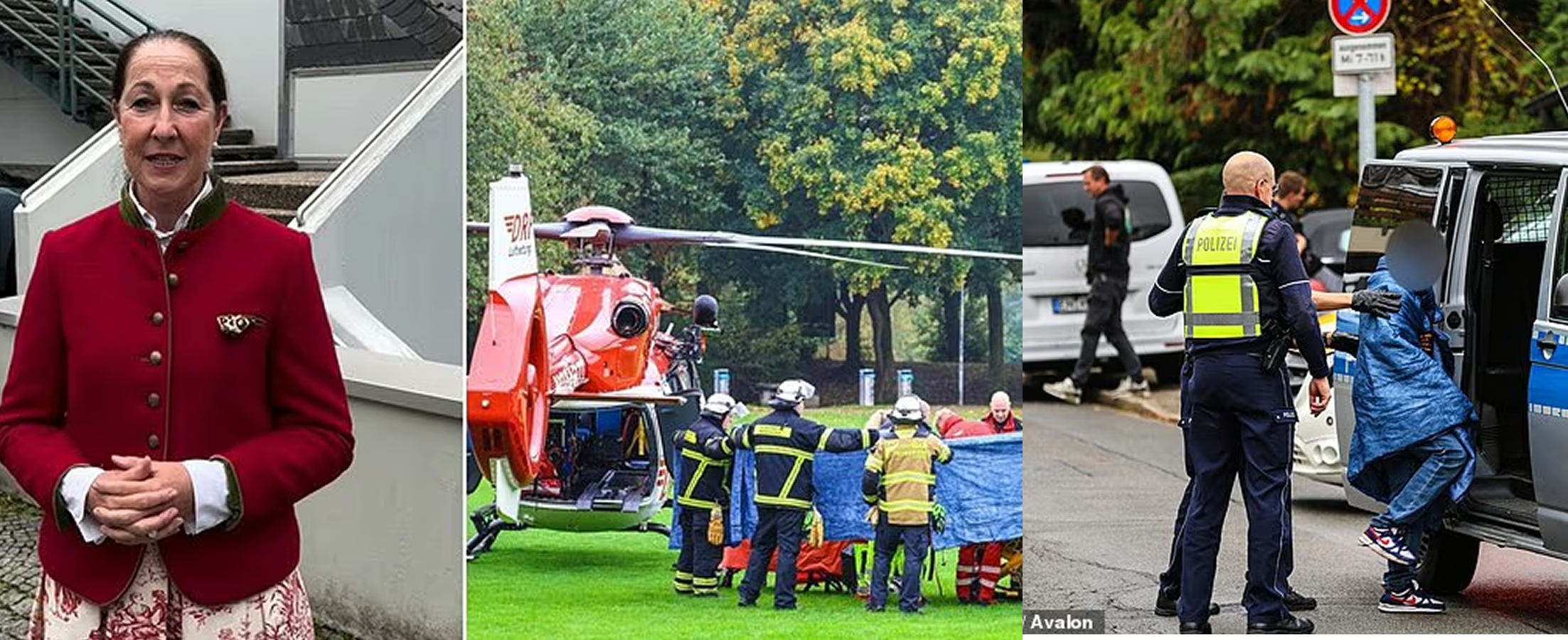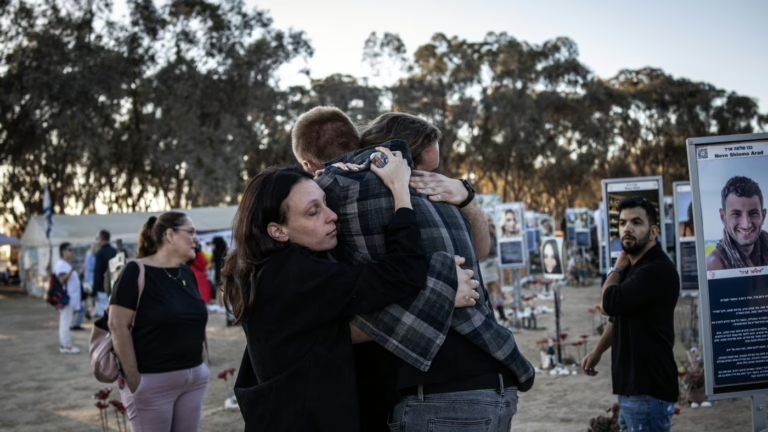People embrace near memorials commemorating victims of the October 7, 2023 attacks at the Nova Festival grounds in Reim, southern Israel, on the second anniversary of the Hamas-led assault.
John Wessels/AFP via Getty Images
hide caption
toggle caption
John Wessels/AFP via Getty Images
This article is part of NPR’s ongoing coverage marking two years since the Hamas-led offensive on Israel on October 7, 2023, and the continuing conflict in Gaza. For further insights, analysis, and diverse perspectives, visit npr.org/mideastupdates.
JERUSALEM – On a street ironically named Gaza, Israeli Prime Minister Benjamin Netanyahu resides in a penthouse apartment above a sushi eatery.
One afternoon recently, a man stood outside holding a megaphone, calling out to the prime minister and his wife by their nicknames, “Bibi and Sara.”
“It’s Rom’s father,” he announced.
Ofir Braslavsky’s 21-year-old son, Rom, remains a captive in Gaza, held hostage since Hamas’s brutal incursion into southern Israel on October 7, 2023, which ignited the devastating war in Gaza.
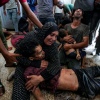
As Netanyahu escalated military operations this year, families of hostages have mounted their own relentless campaign, urging him to negotiate with Hamas to secure the release of their loved ones before it’s too late.
These families represent some of the most deeply affected individuals in Israel, bearing the unbearable personal toll of a war that has dragged on for two years.
“I refuse to let them return my son in a coffin,” Braslavsky declares passionately.
The toll of deepening national rifts amid conflict
Among those camped outside Netanyahu’s residence is Mor Goddard, a survivor of the Hamas attack on her kibbutz near the Gaza border, who lost her parents and much more.
“I lost faith in my country and its army. Terrorists broke into my home, tried to force open the safe room, and when they failed, they set the house ablaze. No one came to help,” Goddard recounts. “I know what abandonment feels like – hours of silence while my friends and family were being murdered.”
Since that day, she has grieved not only her personal losses but also the path Israel has taken in its pursuit of Hamas, trying to recover her father’s body, held by militants in Gaza as leverage, along with other hostages.
“From October 8 until now, Israel’s actions have been driven by vengeance rather than principles,” she reflects. “It’s like a snowball rolling uncontrollably.”
This sentiment highlights a significant consequence of the prolonged conflict: a growing portion of Israelis no longer support the war. A recent survey by the Israel Democracy Institute revealed that approximately 66% of Israelis desire an end to the fighting.
“The initial unity that launched this war has significantly eroded over time,” explains Oren Tene, a psychologist and director of the Public Mental Health Institute at Tel Aviv Medical Center. “When a nation is divided about the righteousness of its war, the collective suffering intensifies.”
The mental health crisis affecting soldiers and civilians alike
Over the past two years, Israel’s military has struck deep into enemy territories, conducting operations in Lebanon, Syria, Yemen, and Iran, while maintaining a fierce campaign in Gaza.
Back home, Tene has observed a surge in prescriptions for anti-anxiety medications such as Valium and Klonopin. The 12-day conflict with Iran in June, marked by missile attacks on Israeli cities and families sheltering underground, was particularly traumatic, leading to a spike in patients seeking help.
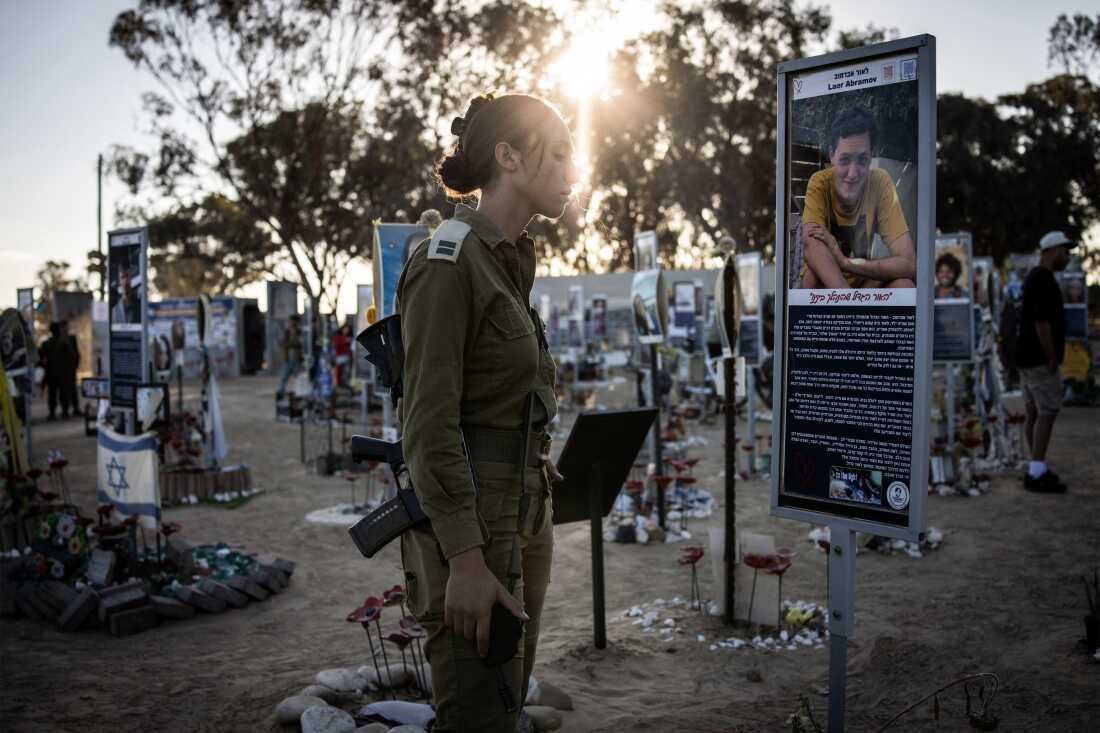
An Israeli soldier stands before a memorial honoring victims of the October 7, 2023 attacks at the Nova Festival grounds in Reim, southern Israel, on the second anniversary of the assault.
John Wessels/AFP via Getty Images
hide caption
toggle caption
John Wessels/AFP via Getty Images
“Many suffer from insomnia, constant anxiety, and difficulty focusing. They question their future here,” Tene says.
Following the October 7 attack, Israel loosened gun licensing regulations, distributing thousands of firearms daily to civilians rattled by the violence, which has unfortunately led to a rise in domestic abuse cases.
Tene has also treated young soldiers returning from Gaza, haunted by survivor’s guilt after witnessing the deaths of comrades. Israeli military data reports 466 soldier fatalities in Gaza, with friendly fire accounting for 15% of these losses.
He notes many soldiers confess to having unintentionally harmed Palestinian civilians, experiencing what mental health experts term moral injury.
“They often express feelings of betraying their own values. If you’ve shot a child, that memory stays with you forever,” he explains.
The erosion of empathy toward Palestinian suffering
What soldiers witness in Gaza remains largely unseen by most Israelis, as media coverage tends to shield the public from the harsh realities.
This has contributed to a troubling decline in empathy for the hardships endured by Palestinians.
Keren Gill, an economist who recently joined a protest advocating for an end to the war and the release of Israeli hostages, admits her compassion for Gaza’s civilians has diminished over the past two years.
“Before October 7, I believed there were innocent families in Gaza just trying to live peacefully,” she says. “Now, I don’t think anyone there is innocent.”
She is disturbed by reports that some hostages were held captive in private homes, including that of a Gaza doctor.
“Is it believable that a doctor would harbor hostages? I can’t accept that. So, for me, I no longer care about the people of Gaza,” she states.
Efforts to rekindle understanding and compassion
In an attempt to bridge this empathy gap, Israeli Middle East politics researcher Assaf David has gained a following by translating everyday Palestinians’ Facebook posts into Hebrew.
One poignant post by Gaza father Saed Abu Eita, roughly translated, reads: “This is a photo of me with my daughter Mira before the war. I loved her deeply. I lost her. I never got to say goodbye, and I don’t know who buried her.”
“The response from Israelis was surprising; I didn’t expect such concern for Gaza’s suffering,” David remarks.
He believes that sharing these personal stories on social media helps Israelis who are skeptical to grasp the human cost inflicted on Palestinians.
“I fear the long-term consequences of this empathy deficit because it perpetuates itself. The psychological, moral, and ethical tolls weigh heavily on the soul, and these will be the hardest wounds to heal,” David warns.
The repercussions of international backlash against Israel
Across Europe, protests against Israel’s military actions have become widespread. Israeli officials report numerous attacks on Jews and Israelis abroad during the conflict. International sports and cultural events are debating bans on Israeli participants, while countries including Germany have imposed arms embargoes.
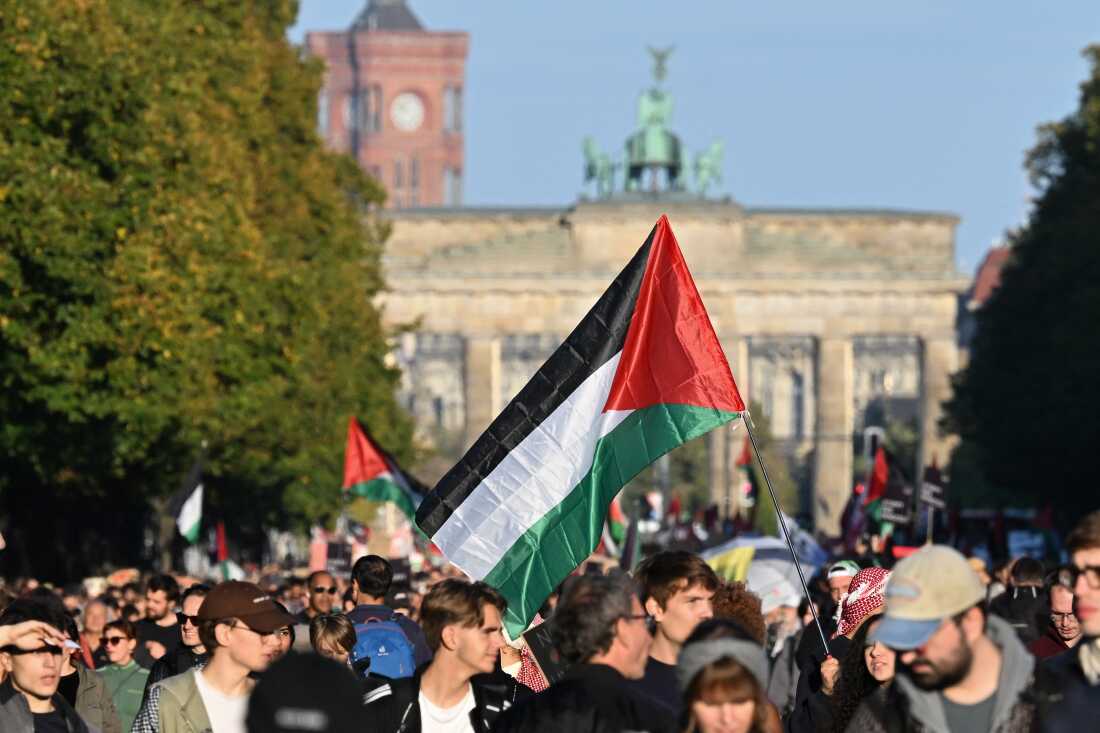
Protesters wave Palestinian flags during a rally near Berlin’s Brandenburg Gate on September 27, calling for an end to Israel’s military operations in Gaza.
Ralf Hirschberger/AFP via Getty Images
hide caption
toggle caption
Ralf Hirschberger/AFP via Getty Images
From initial global sympathy following the October 7 attacks, Israel now faces accusations of genocide and war crimes in international courts.
The government has advised Israelis abroad to keep a low profile and remove social media posts related to their military service, as some countries pursue war crimes charges against Israeli military personnel traveling overseas.
Despite these warnings, many continue to travel internationally.
The challenges of international travel for Israelis
Tel Aviv’s international airport serves as a vital escape for Israelis seeking respite from the pressures of wartime life. However, missile attacks from Yemen and Iran have repeatedly disrupted flights, complicating travel plans.
At the airport, 25-year-old Oshri Avata prepares to fly to Georgia after multiple deployments in Gaza and Lebanon with an elite undercover unit. While his comrades attend group therapy to process their experiences, Oshri chooses to avoid it.
“I ran from that. I want to fly, to see the world. For me, that’s a form of healing,” he explains.
Another traveler, 30-year-old Aviv Hajaj, had planned to attend a Beyoncé concert in Paris this summer, but the war with Iran forced her flight’s cancellation. Now boarding a flight to Athens, she feels anxious.
“I probably won’t speak Hebrew in public spaces. It’s frustrating. The fact that we have to fear traveling the world – I just want this to end,” she says.
“Our story will have a hopeful conclusion”
The airport parking lot walls are plastered with stickers bearing the smiling faces of young Israeli soldiers who have fallen in the war.
One sticker stands out, quoting a mother’s eulogy for her son killed in Gaza: “Our story will have a good ending.”
When this conflict finally concludes, Israelis will begin to confront the profound costs they have endured over these past two years.
Report contributed by NPR’s Carrie Kahn from Tel Aviv, Israel.



